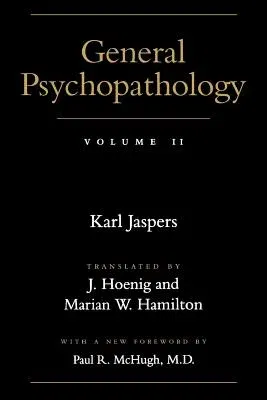Karl Jaspers
(Author)General Psychopathology (Revised)Paperback - Revised, 18 November 1997

Qty
1
Turbo
Ships in 2 - 3 days
Only 3 left
Free Delivery
Cash on Delivery
15 Days
Free Returns
Secure Checkout

Part of Series
General Psychopathology
Print Length
594 pages
Language
English
Publisher
Johns Hopkins University Press
Date Published
18 Nov 1997
ISBN-10
0801858151
ISBN-13
9780801858154
Description
Product Details
Author:
Book Edition:
Revised
Book Format:
Paperback
Country of Origin:
US
Date Published:
18 November 1997
Dimensions:
22.71 x
15.19 x
2.72 cm
ISBN-10:
0801858151
ISBN-13:
9780801858154
Language:
English
Location:
Baltimore
Pages:
594
Publisher:
Series:
Weight:
675.85 gm